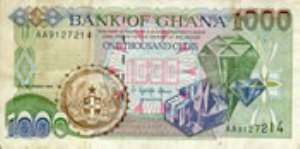
People who once destroyed or threw away their old currency, should now begin to relish the notes and coins because traders in the business of buying and selling antique currencies are putting value on them.
These traders sell money as old as the one penny coin (kapre) dated 1952, used during the British colonial era. The 10-cedi note of 1973, 10 cedis (1978); 50 cedis (1979); 50 cedis (1980); five cedis (1982) as well as the recent 500, 1000, 5000 and IO,OOO-cedi notes, which were used in the 1990's.
In an interview with one of the traders, who pleaded anonymity, she disclosed that people brought their old currencies to her at a fee.
She said they did their transactions mostly with relatives of rich old people who had no use for the old notes and coins.
“We negotiate the prices based on how old the money is. The notes are sold to us at a higher price than the coins”, she explained.
“Old currencies like the 'Kapre' coin are bought for 50 Ghana pesewas, but the not so old ones like the 200 cedi coins go for five Ghana pesewas.
The notes are all sold to the dealers at 50 Ghana pesewas.
However, the dealers sold 'Kapre' coins to buyers at GH¢1.00 each, while the relatively new currencies went for 10 pesewas each. Generally, the sales price ranged from GH¢5.00 to one Ghana cedi based on the buyer's negotiation skills.
When this reporter asked whether the business had a huge patronage, the dealer laughed and said, "people buy them more than they even buy snacks. I have many customers. This job has become very lucrative.”
She said she could not even count the number of people who came to her everyday because they were many.
She said people, including foreigners sometimes bought old currencies to show to their friends and children the money used during a particular period in Ghana.
The seller pointed out that other buyers also bought the old notes to create albums that beautifully showcased the old currencies.
There was also an example of a teacher, who bought the old currencies for teaching purposes. According to another dealer (a gentleman), who also wanted to remain anonymous, people used the money for 'juju'.
He said some spiritualists demanded some of the old currencies for their rituals.
When the Bank of Ghana was contacted for comments on the money business, the Public Relations Officer, Ms Esi Hammond, told The Mirror on phone that the Bank had no idea about the business and that their security outfit would investigate the matter to enable the bank to respond appropriately to the development.




 'Kill whoever will rig Ejisu by-election' – Independent Candidate supporters inv...
'Kill whoever will rig Ejisu by-election' – Independent Candidate supporters inv...
 Ashanti Region: ‘Apologize to me for claiming I owe electricity bills else... – ...
Ashanti Region: ‘Apologize to me for claiming I owe electricity bills else... – ...
 Ghana is a mess; citizens will stand for their party even if they’re dying — Kof...
Ghana is a mess; citizens will stand for their party even if they’re dying — Kof...
 Internet shutdown an abuse of human rights — CSOs to gov't
Internet shutdown an abuse of human rights — CSOs to gov't
 Free SHS policy: Eating Tom Brown in the morning, afternoon, evening will be a t...
Free SHS policy: Eating Tom Brown in the morning, afternoon, evening will be a t...
 Dumsor: A British energy expert 'lied' Ghanaians, causing us to abandon energy p...
Dumsor: A British energy expert 'lied' Ghanaians, causing us to abandon energy p...
 What a speech! — Imani Africa boss reacts to Prof. Opoku Agyemang’s presentation
What a speech! — Imani Africa boss reacts to Prof. Opoku Agyemang’s presentation
 Dumsor: Tell us the truth — Atik Mohammed to ECG
Dumsor: Tell us the truth — Atik Mohammed to ECG
 Dumsor: Don't rush to demand timetable; the problem may be temporary — Atik Moha...
Dumsor: Don't rush to demand timetable; the problem may be temporary — Atik Moha...
 Space X Starlink’s satellite broadband approved in Ghana — NCA
Space X Starlink’s satellite broadband approved in Ghana — NCA
